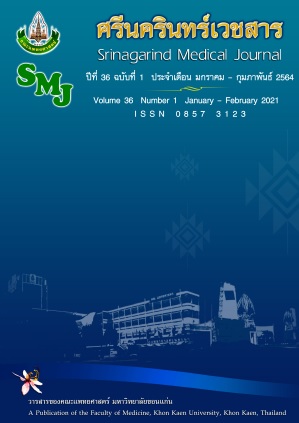The Effectiveness of Health Literacy Development Program in the First-Degree Relatives of Breast Cancer Patients on Breast Cancer-Preventive Behaviors
Keywords:
Health literacy Development; Breast cancer preventive behaviors; First degree relative of breast cancer patientAbstract
Background and Objectives: Breast cancer is the most common invasive cancer and it is the third leading cause of cancer deaths among women in Thailand. Lifestyle changes are shown to be important in the prevention of breast cancer. This study aimed to study the effectiveness of program for health literacy development of the first-degree relative of breast cancer patient.
Methods: This study is a double blind randomized controlled trial, with two groups’ pretest-posttest control group design. The study was conducted among the first-degree relatives of breast cancer patients attending the Ubon Ratchathani Cancer Hospital. The 48 samples aged between 20-65 years old were randomly assigned to 2 groups which consisted of 24 samples for each group. The experimental group participated in the effectiveness of program for health literacy development of the first-degree relatives of breast cancer patients on breast cancer preventive behaviors, controlled group received routine care. The study was conducted over a period of 5 weeks.
Result: The result of participating in the health literacy program had been found that the experimental group had mean score of health literacy, health literacy in breast cancer prevention, breast cancer prevention behavior and breast self-examination skill higher more than the control group significantly (p < 0.05). The posttest of experimental group has managed stress better than the control group significantly (p < 0.05).
Conclusion: This program able to development for health literacy and behavior in breast cancer prevention and improving breast self-examination skills.
References
2. Imsamran W, Supattagorn P, Chiawiriyabunya I, Namthaisong K, Pattatang A, Wongsena M, et al. Cancer in Thailand IX, 2013-2015. Bangkok. [Internet]. 2019. [cited Jun 1, 2020]. Available from:http://www.nci.go.th/th/File_download/Nci%20Cancer%20Registry/In%20Cancer%20in%20Thailand%20IX%20OK.pdf
3. หน่วยทะเบียนมะเร็ง โรงพยาบาลมะเร็งอุบลราชธานี. สถิติโรคมะเร็งโรงพยาบาลมะเร็งอุบลราชธานี. [Internet]. 2559. [cited Jun 1, 2020]. Available from: https://uboncancer.go.th/ubcc2016v2/statcancer.php
4. Chaveepojnkamjorn W, Thotong R, Sativipawee P, Pitikultang S. Body Mass Index and Breast Cancer Risk among Thai Premenopausal Women: a Case-Control Study. Asian Pac J Cancer Prev 2017; 18: 3097-3101.
5. Miller AB. Practical applications for clinical breast examination (CBE) and breast self-examination (BSE) in screening and early detection of breast cancer. Breast Care (Basel) 2008; 3: 17-20.
6. Kickbusch I. The contribution of the World Health Organization to a new public health and health promotion. Am J Public Health 2003; 93: 383-8.
7. Das S, Mitra K, Mandal M. Sample size calculation: basic principles. Indian J Anaesth 2016; 60: 652-656.
8. Rastegar M, Mahmoodi Z, Esmaelzadeh Saeieh S, Sharifi N, Kabir K. The Effect of Health Literacy Counselling on Self-Care in Women after Mastectomy: a Randomized Clinical Trial. J Caring Sci 2020; 9: 39-45.
9. วิมล โรมา, ชะนวนทอง ธนสุกาญจน์, มธุรส ทิพยมงคลกุล, ณัฐนารี เอมยงค์, นรีมาลย์ นีละไพจิตร, สายชล คล้อยเอี่ยม และคณะ. การสำรวจความรอบรู้ด้านสุขภาพของประชาชนไทย อายุ 15 ปี ขึ้นไป พ.ศ. 2560 (ระยะที่ 1). [Internet]. 2561. [cited Jun 6, 2020]. Available from: http://164.115.27.97/digital/files/original/a6e73814efb58a07991c5be54b1498d1.pdf
10. World Health Organization. Breast cancer: prevention and control. [Internet]. 2551. [cited 2020 Jun 5]. Available from: https://www.who.int/cancer/detection/breastcancer/en/
11. Barry D Weiss, Mary Z Mays, William Martz, Kelley Merriam Castro, Darren A DeWalt, Michael P, et al. Quick assessment of literacy in primary care: the newest vital sign. Ann Fam Med 2005; 3: 514-522.
12. สุวัฒน์ มหัตนิรันดร์กุล, วนิดา พุ่มไพศาลชัย, พิมมาศ ตาปัญญา. การสร้างแบบวัดความเครียดสวนปรุง. วารสารสวนปรุง 2540; 13: 1-20
13. กรมอนามัย กระทรวงสาธารณสุข. คู่มือการอบรมอาสาสมัครสาธารณสุขในการดูแลและเฝ้าระวังสตรีไทยจากมะเร็งเต้านม. [Internet]. 2561. [cited Jun 6, 2020]. Available from: https://hp.anamai.moph.go.th/article_attach/คู่มือการอบรมอาสาสมัครสาธารณสุขในการดูแลและเฝ้าระวังสตรีไทยจากมะเร็งเต้านม.pdf
14. Nutbeam D. Health Literacy as a public health goal: a challenge for contemporary health education and communication strategies into health 21st century. Health Promot Int 2000; 15: 259-267.
15. สมฤดี อรุณจิตร, รุ้งระวี นาวีเจริญ. ผลของโปรแกรมการสอนแนะต่อพฤติกรรมการป้องกันมะเร็งเต้านมในสตรีกลุ่มเสี่ยง. วารสารพยาบาลทหารบก 2562; 20: 289-297.
16. ณัฐณิชา แหวนวงศ์, สุรีพร ธนศิลป์, รุ้งระวี นาวีเจริญ. ผลของโปรแกรมส่งเสริมสมรรถนะแห่งตนต่อพฤติกรรมป้องกันมะเร็งเต้านมในสตรีกลุ่มแม่บ้านทำความสะอาด. วารสารพยาบาลสงขลานครินทร์ 2562; 35: 21-36.
17. ปรียานุช มณีโชติ, ประณีต ส่งวัฒนา, สุรีย์พร กฤษเจริญ. ผลของโปรแกรมการสอนแบบสร้างแรงจูงใจต่อการรับรู้เกี่ยวกับโรคและอัตราการมาตรวจคัดกรองมะเร็งปากมดลูกของสตรีไทยในชนบท. ศรีนครินทร์เวชสาร 2554; 26: 9-16.
18. รุ้งระวี นาวีเจริญ, สุรศักดิ์ ตรีนัย, นพมาศ พัดทอง, สุวิมล โรจนาวี. ผลของโปรแกรมการพัฒนาศักยภาพในการป้องกัน มะเร็งเต้านมและการติดตามด้วยโทรศัพท์ต่อพฤติกรรม การป้องกันมะเร็งเต้านมของ บุคลากรหญิงจุฬาลงกรณ์มหาวิทยาลัย. วารสารแพทย์นาวี 2561; 45: 187-201.




